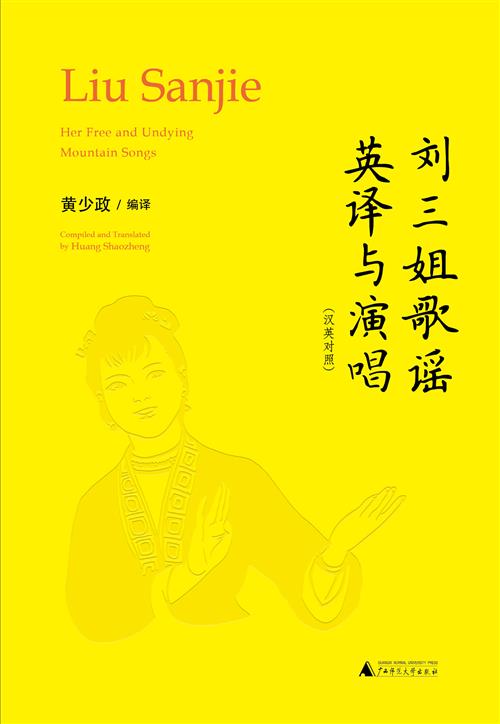
出版时间:2021-08-01
定 价:58.00
作 者:黄少政 编译
责 编:唐俊轩
图书分类: 音乐
读者对象: 大众读者、英语专业读者、民间歌舞剧爱好者
上架建议: 文学、民间歌谣
开本: 32
字数: 210 (千字)
页数: 256

被壮乡人民奉为歌仙的刘三姐,一直都是能歌擅唱、鄙视权贵、崇尚自由、反抗不义的化身。20世纪50年代末以来,基于对原生态民间传说的整理改编,历经戏剧、电影、小说、诗歌等不同形式的塑造,刘三姐早已声名远播,成为广西亮丽的文化名片和重要的非物质文化遗产。
本书作者从众多文学和影视作品中精心挑选,将刘三姐歌舞剧剧本及其他脍炙人口的刘三姐歌谣首次按照可读、可唱的标准译成现代英语。本书旨在提供一个文学性、表演性兼备,能被英语读者认可的翻译文本,为刘三姐的歌谣和传说走出中国、走向世界提供可靠的演唱基础。
In the karst mountains in southern China, Liu Sanjie, a legendary folk song singer, has been venerated for many generations by the Zhuang people. For them, Liu Sanjie was and remains a saint, a symbol of the integrity, sensuality and resilience of their mountain culture. For what makes Liu Sanjie and her modern adaptations in various forms unique is her music, "Mountain Songs", are sung on hilly terrain and open spaces by the Zhuang people, remote and sequestered from the moralistic monarchies and stuffy Confucian scholar-bureaucrats in the interior China in ancient times. Young singers would often engage in singing duels where they would pit their wits against each other using riddles and word play and choose spouses mostly on that account. There is a mix of the earthiness, the sensuality, the play, and the tenderness that easily elude the uninitiated in the mainstream culture.
This fresh rendering of Liu Sanjie’s songs is addressed to the general readers of English speaking world with two aims topmost in the mind of the translator: readable and singable, the first of its kind since Liu Sanjie debuted in the Liuzhou Caidiao Opera in 1959.
黄少政
1980年代先后毕业于原上海外国语学院和四川大学,独立翻译学者,中国作家协会会员。多年从事疑难西方文本、汉译英文本的翻译。出版著作《翻译的成色》,代表性译作包括《圣经?新约》,纪伯伦诗歌《先知》,吉狄马加作品《为土地和生命而写作》《从雪豹到马雅可夫斯基》《敬畏群山》等。
Huang Shaozheng
Graduated from Shanghai Foreign Languages Institute in the early 1980s, his lifelong passions are for translation of literary works, either in Chinese or in English, which do not lend themselves to easy and normal rendering, either from Chinese into English, or the other way round, for example, Translation Paid in Gold (2012), Gibran’s Prophet (2012), New Testament (2016), eminent Chinese Yi poet Jidi Majia’s In the Name of Land and Life (2013), From the Snow Leopard to Mayakovsky (2017), Mountains That Humble and Hold Us in Awe (2018) etc.
序
第一部分 歌舞剧《刘三姐》剧本
第二部分 彩调剧中的刘三姐歌谣
第三部分 刘三姐歌谣唱曲译配
后 记
序
有一种爱叫山歌
马克·特雷迪尼克
一
相传在中国南方桂林城附近的喀斯特山区,生活过一位秀美的农家姑娘。她动人的歌喉婉转而又迷人,天地万物无不为之赞叹,山川、河流无不为之动容,令百鸟鸣啭黯然失色,精通音律者自叹弗如。她的美貌更令当地广有田产的土豪垂涎三尺,不惜高价雇用秀才在歌圩上与她一决高下。有人说,姑娘逃离了土豪的迫害,与恋人隐姓埋名,遁入了大山深处; 更有传说,这对情人变成了两只鸣禽,这是他们为歌咏自由和爱情付出的代价。
这位壮族“歌仙”人称刘三姐,相传生活于公元8世纪初的唐朝。她在鱼峰山下唱过的歌谣和其他山歌都是即兴创作的。三姐秀外慧中、才情斐然,被壮族人奉为仙女,此后1300多年间,她的歌谣经口耳相传,经久不衰。她集山歌创作与演唱于一身,可谓前无古人,后无来者。
即便这样的歌仙不曾真实存在,历史也一定会创造一个刘三姐。事实证明的确如此。这个姑娘和她的歌谣、短暂而极富诗意与英雄气概的一生,是所有时代都需要的养分,是人类精神赖以生存的神话。文学所为者何?不就是书写讴歌这样的平民英雄吗?而刘三姐的故事和歌谣经历代搜集、整理、传唱,终于汇集成了一种精致的民间歌谣文学。纵观人类历史,寄寓文学作品的“兴、观、群、怨”的种种主张和因此彰显的真、善、美,都在她的歌谣中一一得到了实践:她主持正义,谴责不公;在思想、精神和肉体层面她都拒绝屈服于任何权势,也绝不让我们屈服;她歌咏艰辛凡世中的点滴快乐,这种乐观的生活态度,凝结在歌声中化为永恒。她,一如所有高迈真诚的诗歌,是正义、美、爱与自由的化身。
刘三姐身处男权社会,又归属主流文化之外的边疆民族。她出身贫寒,每一天醒来就要为谋生而劳作,族人还饱受欺凌压迫。可她天生有一副好嗓子,虽身处边缘与委顿穷困,却唱出了鄙视强势话语的歌谣,对得之不义的财富嗤之以鼻,以一种罕见的决绝和自觉守护个体生命的自主和神圣,并向世界大声宣称:青春神圣,爱情神圣,年轻拥有随心而非随俗的权利。她歌颂了灵魂对世界的叛逆、自我对险境的反抗、底层对强权的斗争。
正因如此,刘三姐才称得上是独立女性,她的歌谣才称得上是文学,流芳千载,激励世人。刘三姐的这些歌谣,看似是自中古以来流传下来的民歌蓝本,在黄少政笔下被译为短小精练的现代英语文学作品后,更像是在我们这个时代创作出来的。刘三姐简直像是为我们这个时代而生的。当下,东西方的艺术文化学者都将目光投向少数民族文化、女性艺术、沉默群体、边缘群体和殖民地的诗歌,活在唐朝的刘三姐,这个南方大山里的壮族民谣歌者,也以女性之身,为我们的时代唱响赞歌。
时至今日,刘三姐仍是壮族人心中的神,是山野文化中正直、不羁与坚韧的象征。儒家学者将她塑造为一个音乐奇才,给她编配了一个出身上层的丈夫;年轻的新中国也打出她的旗帜,将她拥戴为人民英雄、反抗压迫的斗士、敢于智斗嘲弄旧知识分子的歌者。在以她名字命名的彩色电影中,刘三姐被刻画为人民的女儿、胆识过人的阶级战士。电影1961年上映时,在国内外大获成功,广受赞誉。其后,她成了壮族的标志,为广西的文化发展、民族融合做出了贡献。而如今,刘三姐成了国内外游客纷纷探访桂林的缘由之一,是仅次于桂林喀斯特地貌的广西第二大旅游热点,几个世纪以来,一直吸引着诗人、画家与朝圣者慕名前来。
隐于山野,天真未凿,年轻姑娘声如天籁,歌声不绝;山歌悠扬,即兴而成,所歌者何,歌为心声。
二
我有幸以诗人身份数次访游中国,曾受邀去北京参与国际写作计划,在鲁迅文学院待过一个月,也曾参加过在香港、杭州、西昌、汨罗和成都举办的诗歌节,算得上半个中国通,但不知何故,与刘三姐却总无缘相会,直到黄少政教授将她的诗歌和故事带到我眼前。对鱼峰山和广西漓江畔回荡着刘三姐山歌的群山,我一直心怀憧憬,无奈刘三姐总是从我的世界路过。1961年的电影我没看过,此前那部火遍中国大江南北、令毛主席也如痴如醉的音乐剧我也没看过,就连从2004年起就蜚声国际的绚丽多彩的户外声光秀《印象?刘三姐》,我都不知其名,对刘三姐这个壮族文化象征、桂林名片一无所知,我着实赧然。
在我未读到少政的译文,不曾结识刘三姐的时光里,她似乎已被赋予了千百次新生。她受山民景仰爱戴,被转化为精神符号,经过无数次解读、诠释、想象与塑造;她的故事也被接受、化用。而现在,我已读过了关于刘三姐的研究,看过了电影,也演奏了她的歌谣,能在黄少政教授的翻译中邂逅这位灵动善辩、胆识过人、天仙一般的壮族民谣歌者,我感到三生有幸。(我又多了一个理由让自己前往桂林游览,现在这本书就成了我的最佳导游。)
少政的译文含蓄自然,毫无浮嚣之气,我在其中遇见了纯真的刘三姐和她的歌谣。少政将刘三姐与人们以各种方式重构的形象剥离开来,返本归元,还原了她的本来面目,赋予她人性、女性特质和民族特异性,还读者一个赤子般的刘三姐。
我们在刘三姐歌谣中和一个不凡的灵魂不期而遇,她不附庸任何人,天生丽质,这是大山的产物,野性、不羁、爱是她的最高信仰。因而在她的歌谣里,我们与自我不期而遇——一个尚未被觉察的更好的自我,若有她一半锐气,本可以成为的那种自我。
其实我们每个人心底都有一个刘三姐,只不过我们需要聆听刘三姐的歌谣,就像我们必须阅读李白、密罗跋伊、狄金森、阿赫玛托娃,他们会引领我们省察自己的人生,返璞归真,更富于人性。别忘记,超越性别、阶层、身份(被强加的、抗拒的、认定的),拨开上天的眷顾、亏待,比坎坷、苦难和宿命更深的灵魂深处,有一片群山,群山的歌谣真切悦耳,如莺啼百啭;有一个自我,铮铮玉骨,唱着山中浩歌,遗世独立,陶然自乐而心怀悲悯。
三
少政以全新的视角解读了刘三姐,他不拘泥于此前人们建构的刘三姐形象,邀请我们一道从全新的角度走近她。此前,刘三姐是才华横溢、天真无邪的传统儒家闺秀,也是阶级革命的英雄,而少政独辟蹊径,将她与这些形象剥离。摆脱了先入之见,我们就能静候佳音,在山歌中邂逅一位歌唱家和作家,壮族人民的女神,一个凡人,但确实天赋异禀, 一个有血有肉的人。
少政帮助我们欣赏到了纯真的刘三姐山歌。刘三姐曾被挪用、改编以服务于各种目的:古代家长制对她形象的塑造、20世纪60年代社会现实主义对她的新解读。少政别出心裁,他提出了两种审视刘三姐山歌的路径,并在翻译中遵循了这两种路径。
首先,少政明智地建议我们把刘三姐山歌视作特定地理位置与当地盛行的文化规范的实体(这些文化规范在固守传统的地方依然盛行)。在聆听这些歌谣时,多多少少把它看作是一种特定时代民俗的结果。所有艺术作品中都包含情爱的因素,在我看来不无道理,因为艺术是参与创作的行为,一种爱的行为,一种渴望的抒发,一种对美的欢颂,一种狂喜瞬间的定格(亦可以是希冀与绝望)。然而许多文学理论研究,尤其是那些透过权力和经济的关系、阶级、社会类别、既定道德以及各种规范性抽象视角的解读,似乎并不能阐明诗与歌的灵感源泉。诗歌可以来源于忧痛、激愤、欢悦与怡乐;诗歌有所希冀乃至心灰意冷;写诗是对生活不如意与世界不堪的补偿,或对生命本身的感恩,和生活本质的凡俗庸常达成坦然的和解。
奥克塔维奥?帕斯写道,“诗歌即是语言做爱”,这就比西方流行的许多文学论调更切题。正如我最近一篇文章里写的:“无论爱为何物,诗即爱。”如果读懂了刘三姐的歌谣,我们不妨说,确实有一种大爱,叫作山歌。刘三姐的诗歌是爱与欲,温软如玉的呢喃,有慈悲有希望,也有惶惑有尖刺,更有对所爱之人与世人所爱的渴求,也是对积存在世壮族山歌的升华。山歌本就是壮族歌圩的核心,传唱山歌在于和心爱之人共情,而非一定要落实在婚姻之中,心心相印才是这一活动的必要条件。壮族文化历来重视恋爱自由,当代读者也会惊讶于他们的开明。
无论爱为何物,诗即爱:正统文学理论向来难以理解接受这一概念,可事实如此,以诗性的行为和壮族的歌圩文化来理解刘三姐山歌,聆听歌中人性的淳朴,而非将其看作意识形态的实例或仅仅是体现政治和身份的形式,如此一来,恍然间,歌声里的那些拨云撩雨、嬉笑厮磨、暧昧难明、感官愉悦与玩世不恭,霎时一一入耳,了然于心。
少政的另一大突破是将刘三姐的山歌解读为群山的造化,提供了生态批评的解读思路。所谓山歌,与野性、不羁、天真未凿、未经文明浸染同化同义。
这就是说,少政引导我们不要单纯地将刘三姐的山歌上升为民族家国的呼声,钩沉阶级斗争乃至民族身份的因由,抑或只探究其文学作品的底色,这些山歌更像是描摹了中国南方的万千气象、岩溶起伏,是对湍流急雨和莽莽榛榛山地的鲜活注解。壮族文化,包括其中的情爱因素,都是由山地孕育而生的,所谓地理即宿命。在刘三姐的歌谣里,你能找到一个女性生存的土地与根基,蓦然回首,忆起你亦寄身在这世上的某一处所,而在你的生命中、你的文字间、你的情感深处,分明也有大地的旋律涌动。也许这世上某个角落还记得你,于是你的笔触、你的声音、你的双手和生命都在娓娓道来,诉说它的故事,它的今生和来世。
四
国家与事业、反叛与治国,理论家与卫道士,世间形形色色的势力无不试图“征用”艺术。他们扶植艺术宣传自己的主张,发掘既往的作品,彰显同质价值观,或因其缺乏此类价值观而痛陈其堕落退化。
然而,真正的艺术本质上不会屈从、附庸任何权势。大浪淘沙,披沙拣金,艺术永恒。世人攘攘,政治浮沉,艺术如青山依旧,几度夕阳。极而言之,人类少不了艺术,人性健全有赖于艺术。作家、歌手、画家正可以大显身手。存在的喜悦和悲苦,日复一日世间的粗粝与敏感灵魂的二律背反,生活的美好与可怖,艺术就是见证。人生苦短,艺术必须为我们安身立命提供一个说法。悲苦不堪的世间,爱是如何可能?希望与妄想有何分际?我们需要艺术发声,我们指望艺术作证。艺术源于人生,高于人生。人类多数的理论话语往往会忽略深植于人性的这种渴求,不单单忽略,更有甚者,贬低、污名化人性的需求,艺术的出场,为人性正名,为悲悯张目,并在我们的心灵惶惶然处发现了极美的趣致。
艺术的目的,正如我在中国西昌一篇演讲中宣示的,就是自由,就是正义。艺术凭其新奇巧思和清正之气,助我们跳出陈腐与伪善的樊笼,挣脱主流正统的桎梏,表达自由和富于个性的声音,传递艺术家的生活体验。几许匠心,赋予了人生真实的触感,谱写了心灵专属的乐律。
在少政的刘三姐歌谣新译中,自由、喜悦、正义,声声入耳,我们与大地脉动同频共振——世界以爱予我,我亦报之以情。刘三姐的歌是唱给群山的情歌,是对大千世界爱的倾诉。
上周日我听一个学生说起,诗人就要腹有诗书,兰心蕙质。 她说起她的先生,一位诗人,相濡以沫经年。她说起历史上那些著名的大诗人。她说,诗人需要从生活和书本中汲取各种养分,包括思想、历史、音乐、韵律、品格、人性,甚至熟稔植物与禽鸟的学名。果如此,他必须真正走出书斋,学贯百家,臻于会通,才能出口成章,作诗撰文。一个诗人的资质尚且如此,一个译者又要如何万里行路,万卷读书呢?
翻译的确需要一种虚怀若谷的大智慧、豁达冲淡的心境、挥毫落纸的劲头,并守住一份情怀。用母语自然能够畅言真实的所感所念,但若假自己之口,移译他人言语又是另一码事。盖因每种语言自成一世界,译者功夫再深都难以彻悟并在另一种语言中再造原作者的声音、思想和笔调——任何译作都是一部新作。即便译文能传神达意,在形式、情感、态度、音韵、文气和寓意上固然都能忠实于原作,但译作永远不会取代原作。
质量上乘的译品,其意境与原作基本相当,能够再现原作的精神,且在形式上尽可能地效仿原作。作为一种介质、替代品和备选方案,它在功能上等同于原作。这桩活计谁人能够胜任?好坏读者自有公论——拙见非我的朋友少政莫属。除了译者本人,还会有谁能如此钟情于原作,并绞尽脑汁将其原汁原味呈现给读者呢?正是像少政这样的翻译家,他们大大地丰富了我们的世界。我把他们的工作,视为爱的奉献。我无时无刻不对他们心怀感激。我之所以能同托尔斯泰,能同诗人鲁米、阿赫玛托娃、萨福、吉狄马加、屈原、李清照、《圣经?旧约?雅歌》莫逆于心,正是拜翻译所赐。也正是李牧原最早的译本、黄少政等对我的译介,将我的作品带到了中国,用汉语赋予了我的诗文第二次生命。
笔者不谙中文,无法在这里对译文质量做出专业判断。但我知道少政是一位优秀的译者。例如,他将《新约》和纪伯伦的诗歌翻译成中文,将吉狄马加的诗歌和演讲翻译成英语。他被视为当下中国最杰出的双语翻译家之一。少政博学并极富灵性,酷爱世界文学。他如此醉心译介刘三姐歌谣,部分原因是他定居广西,而广西正是刘三姐歌谣的故乡。我还知道他比对研究了之前刘三姐歌谣的其他译本,新的译文大异于从前,他试图在英语中捕捉到早期译本中缺失的某些特殊品质——质朴、感性、戏谑和柔情,早期的译文不可避免囿于彼时翻译习惯和流行教条的影响。
少政还发愿要让刘三姐在英语中唱响。要像在汉语中那样唱得惊天地泣鬼神,绝非译者的本意,但至少要让英语读者听众感受到刘三姐的歌谣有多么优美动听,这一点也不算奢求。
摆在你面前的这部刘三姐歌谣新译,译者试图剥离不同时代的意识形态的“征用”与道德的“挪用”,还原刘三姐歌谣的产生背景和发生场域,重新审视刘三姐传说故事的结构性因素——源于壮族的歌圩文化,带领我们穿越时空,亲耳聆听唱响在旖旎喀斯特山水间的天籁——刘三姐歌谣。透过黄少政的这部译作,我们读到了一个鲜活生动、漂亮机敏、大胆奔放、为民请命的乡野女性,足堪我们追慕一种自由本真的性灵,师法一种朴素高贵的人生。
(焦琳 译)
?
Preface
How to Love Like a Mountain
Mark Tredinnick
1
It is said that in the karst mountains near the city of Guilin in China’s south, there once roamed a beautiful peasant girl, whose singing pleased the heavens and did justice to the beauty of the rivers and the fields and peaks and rivalled the birds and shamed the music scholars and seduced and outwitted an evil landlord. Some say she escaped the tyrant and lived out her days obscurely with her lover in the mountains. Other tellings turn them into two songbirds, the price they paid for their refusal to let the singing of her people be stilled.
She was Liu Sanjie (“Third Sister Liu”), or so she became called. She is said to have lived and sung, this angel of song, during the Tang dynasty, in the early years of the eighth century. Her people were the Zhuang, and her name has been held sacred and her songs have been sung among them these thirteen hundred years since, for she is said to have performed the ballads of Yufeng Mountain, and the other mountain songs of her people, and to have improvised in that idiom, with a divine kind of grace and wit and intelligence. Hers was a talent for composition and performance of the songs of the mountains, the love songs of the earth, never rivalled, before or after.
If such a young woman never existed, history would have to have invented her, and to a large extent it has. She and her music and her short, lyric, heroic life story are the kind of thing all ages need, the kind of myth the human spirit depends upon. Third Sister what literature is for. No matter who co-opts her life and story and songs——and many have——Liu Sanjie made a small literature of folk music that does what literature, through human history, has always done, and which we need it to keep on doing: she insists on justice; she decries inequity; she refuses to be cowed, or to let us be cowed, in mind, spirit, and body; she transfigures everyday experience into small eternities of song. She stands, in other words, as all poetry of integrity does, for justice and beauty and love and freedom.
Liu Sanjie was a woman in a man’s world. Hers was a minority culture. Her family was poor, and as a girl in a tenant-farming family, she had little to hope for from life; her mountain people were colonised and oppressed. She knew no privilege but the gift of her voice. She came from the edges; and from the edges and out of her poverty, she sang what all dominant discourses overlook or disparage: the autonomy and irreverent divinity of each human life, the right of each human heart to love what and whom and how it loves. Her songs sing the rebellion of the soul against the world, of the self against its unpropitious circumstances, of the marginalised against the powerful.
All that makes Liu Sanjie, the Third Sister Liu, a woman, and hers a literature, for all times and all people. But more than ever, her small literature, translated here into clear contemporary English, is a folk poetry for our times. And her life could almost have been coined for these days——as art and cultural scholarship in both the east and the west give attention to minority cultures, to women’s art, to silenced voices, to lives on the margins, to colonised lyrics. Liu Sanjie of the Tang Dynasty, Zhuang folk singer from the mountains of the south, stands as a woman, her songs as anthems, for our times.
For her people, Third Sister Liu was and remains a saint, a symbol of the integrity and sensuality and resilience of their mountain culture. Confucian scholars construed her as a prodigy and married her off to a noble. The young PRC recruited her as a heroine of the people, a champion of the oppressed, and used her as a stick to beat intellectuals with. It is as a darling of the masses, a spunky class warrior, that filmmakers depicted her the film that bears her name shot in technicolour and rolled out to a clamour of popular acclaim in 1961 in China and beyond. Later, she was rebranded as a Zhuang icon, to support a claim for Guangxi’s special administrative status. These days, people from across China and the world travel to Guilin because of her. Among the reasons tourists come to Guangxi, she ranks second only to the karst mountain peaks of Guilin, those darlings, for long centuries, of poets and painters and pilgrims.
Hidden inside these mountains, inside these many incarnations, was this young woman, blessed with an angel’s voice, singing all these years——inside her people’s mountain songs, inside coquettish improvisations——the music of all of our hearts.
2
It has been my good fortune to travel many times to China as a poet. I have spent a month in Beijing at the Lu Xun Academy, a guest of the international writers’ program; I have attended festivals in Hong Kong, Hangzhou, Xichang, Miluo, and Chengdu. I have read widely in Chinese poetry. But somehow, until Professor Huang Shaozheng introduced me to her songs and her life, Third Sister Liu had eluded me. I have longed to visit Yufeng and the mountains her songs ring with, along the Li River, in Guangxi, but Third Sister Liu, herself, had eluded me. I had not watched the 1961 film; I had not seen the musical that preceded it, which travelled China and stole the heart of Chairman Mao; I had not, to my shame, heard of the world-famous high-tech, light-and-sound outdoor spectacular running in Guilin since 2004, Impressions of Liu Sanjie, which celebrates her as an emblem of Zhuang culture, a synecdoche for Guilin.
Before I met her in my friend’s translations, Liu Sanjie had already lived, it seems, a thousand lives. She had been worshipped and celebrated among her people of the hills; she had been venerated and received and repurposed; she had been interpreted, reinterpreted, reimagined, and rebadged; she had been adopted and she had appropriated. Having now read the Liu Sanjie scholarship and seen the movie and played the songs, I am glad to meet her, myself, in Professor Huang Shaozheng’s translations——this feisty, plucky, angelic Zhuang folk singer. (And now I have a new reason to visit Guilin, and in this book I now have the perfect guide.)
It is herself and her songs, in themselves, I feel I meet in this unpretentious translation. For Shaozheng reclaims Third Sister Liu from every way she has been borrowed and restores her to herself; he gives her back to her humanity and femininity and the specificity of her country; and he gives her back to us.
In her songs one meets a human being who belonged to no one but herself, who belonged to no cause but the mountains’, and most of whose politics was love. In her songs, consequently, one meets oneself: one’s unfamiliar better self; the person we would be if we had half her courage.
For inside each of us lives someone like Liu Sanjie. But we need to read her songs, as we need to read the poems of Li Bai or Mirabai or Dickinson or Akhmatova, to remember how we really go, deep down there in our humanity——to be reminded that deeper than our gender, than our class, than our identity (conferred or denied or asserted); deeper than our privilege or our disadvantage, than our trauma or our trouble or our fortune, there are mountains and their songs, sweet and true as birdsong; there is a singing self, indomitable and joyous, beautiful and kind. One of the ways that goes is how Liu Sanjie’s songs go.
3
Huang Shaozheng reads Liu Sanjie freshly, and in his introduction, he invites us to read her freshly, too, unconstrained by how she’s been, to date, construed. He lets her stand clear of the types she’s been cast in: brilliant Confucian ingenue, and proto-revolutionary class heroine. If we can free ourselves of preconceptions, we will stand ready to meet the singer and a writer, the woman of her people, any one of us at all (though more gifted), this flesh-and-blood human, who turns up in these songs.
I’ve said Professor Shaozheng helps us see Liu Sanjie’s work in itself, that he stands her clear of how she has been stolen from herself by the uses to which she has been put——the paternalistic pre-modern construction, the social realist reinterpretation of the 1960s. But Huang Shaozheng reads her, too. He proposes two ways of seeing her in herself. And he translates her with those inflections in mind.
Very sensibly, for starters, Huang Shaozheng suggests that we consider Liu Sanjie’s oeuvre as a manifestation of its place and of the cultural norms that prevailed there (and prevail still where traditional practices thrive). I would have thought it made sense to consider the role of the erotic in all works of art——since art is a participation in creation, an act, generally, of love, an articulation of longing, a celebration of beauty, a moment of ecstasy (of hope or despair etc). But many theoretical readings of literature——in particular those that see through prisms of power and economic relations, of class, of social category, of settled moralities, of various normative abstractions——seem innocent of the wellsprings of poetry and song. One writes from grief and anger and joy and delight; one writes in hope or despair; one writes to run lyric repairs on one’s life and all lives; one writes out of gratitude for being alive among all that is beautiful and all that is not.
When Octavio Paz writes that “poetry is language making love,” he is more on the money than many theoretical readings that prevail in the west. As I say in a recent essay, “whatever love is, poetry does that.” If all literature might be better understood, then, as the practice of affection, seduction, tender recollection, compassion, hope, dismay, provocation, or yearning (for a human beloved or for the beloved in the world), this is even more manifestly the case for Liu Sanjie’s songs, which honoured and transfigured established Zhuang mountain songs, which were themselves a central part of the courting rituals of the Zhuang people, songs which were made and shared to help one make amatory progress——to score, not necessarily a husband or wife, but certainly a lover. For Zhuang culture has always valued freedom of love, in particular before marriage, in a way that contemporary readers might find surprisingly broad-minded.
Whatever love is, poetry does that: a concept theory has always struggled to understand or accept. But so it is, it seems, with Liu Sanjie’s songs, and invited to hear her words in their humanity, as practices of poetry, of Zhuang courting rites, not as instances of ideology or merely as enactments of politics and identity, one suddenly hears the flirtation, feels the playfulness, discerns the innuendo, enjoys the sensuality, understands more fully the irreverence, in these songs.
A second and equally sensible innovation in Huang Shaozheng’s reading of Liu Sanjie is his invitation to see them as manifestations of the mountains in which they came into being. He offers an ecocritical reading. These are mountain songs, and if one feels allowed, on can hear the mountains in them.
Shaozheng invites us, then, to consider in the songs and life of Liu Sanjie as expressions not just national aspiration, nor of class struggle, nor even merely of ethnic identity, nor yet merely as literary artefacts, but as expressions of the weather in China’s south, of the steepness of the karst slopes, and the swiftness of the rivers and the hardness of the rain and the difficulty of the soil. Zhuang culture, including its erotic charge, is what it is because of where it evolved. Geography is destiny, as it has been said. In these songs, then, find the ground of one woman’s being, and recall that you, too, are home somewhere on this earth, and in your life and in your word and in how you love, geography sings; there is perhaps a place that remembers you, and in the work or your voice or hands or life, you manifest something of what that place knows and how it goes.
4
States and causes, rebels and rulers, theorists and defenders of prevailing intellectual norms——all these forces, everywhere on earth, want to recruit art. They sponsor new work that practises ideals they value; and they find in old work manifestations of those same values, or evidence of degeneracy in the absence of those values.
But real art is not for bending; it endures and survives. Beyond the shifting causes and beliefs and theories that seek to recruit art, art is needed. Humanity needs it. And writers and singers and painters will always supply that need. Which is to bear witness to the pain and delight, the infernal contradiction, the beauty and the terror entailed in Being: What it feels like to live a short while on an astonishing and sometimes appalling Earth, how one goes about fashioning meaning from the chaos of things, how one hopes and loves, notwithstanding the evidence to hand. This is why we need art, and it is what art has always tried (even without knowing it) to articulate. And we need art to keep doing that because it alone does justice to the felt-sense of being alive. Whereas most other discourses overlook our humanity, diminish it or disdain it, art (songs such as these) sees us. Art allows us and redeems us in our ordinary humanity. Art alone forgives us for being human. It makes beauty of our confusion.
Art, then, as I found myself saying in a paper I gave once in Xichang, is for freedom and it is for justice. In its freshness and originality and integrity, it frees us from cliché and cant; in its freedom from orthodoxy, in its individuality of voice, it does justice to an artist’s lived experience, and it justifies, in its own sui-generis achievement, the authenticity of each human life; it justifies and allows the particular music of each human heart.
One hears all this——the freedom, the joy, the justice——in Huang Shaozheng’s new translations of the songs of Liu Sanjie. One hears the heartbeat of the Earth——how the Earth loves us and how it would be loved in return. These folk songs are a kind of love song to the mountains, and beyond them all the Earth.
Poets have to know so much, I heard a student say last Sunday. She had in mind a poet whom she’d been married to for many years; she had in mind the many she had read. And she meant how much the poet has to study in life and in books about ideas and history and speech music and metrics and characters and about human nature and the names of trees and birds. It’s true you have to get out a bit and go to many different kinds of school and get across disparate bodies of knowledge to make poetry and other forms of literature. But how much more then must the translator know.
Truly, translation is a practice of deep humility and great wisdom, of generosity and courage and faith. It is one thing to sit in one’s own language and say what one perceives to be real and to matter; it is another to take the authentic utterance of another and to seek to do justice to it in one’s own voice in a tongue the first speaker could not speak. Because each language is another universe, and because the translator, no matter how hard she tries, will not divine and recast in a new tongue the voice and mind and manner of the author of the original work, in her mother tongue——each translation is new work. If it is honourably performed and well-achieved, it will, of course, be faithful in form and mood and attitude and voice and sense and implication to the original. But it can never be that original work.
A good translation gives a close impression. It adequates the original; it approximates it. It stands in for it, a proxy, a substitute, an alternate. And who would perform this work, which inevitably invites comparison and critique, but someone passionately dedicated to the work they translate? Who but a dedicatee, a lover of the original work would labour to bring to a new readership a faithful likeness? The world is immeasurably richer because of the work of translators, and I think of their work, including that of my friend Huang, as the work of love. I express my gratitude to them every day. I would have no Tolstoy, no Rumi, no Akhmatova, no Sappho, no Jidi Majia, no Qu Yuan, no Li Qingzhao, no Song of Songs, without translators. And my work would not have come to China without Isabelle Li, who translated it first, or without Huang and others, who have given my poems and essays a second life in Chinese.
I don’t know Chinese well enough to make that judgment here. But I know that Professor Shaozheng is a fine translator. He has translated, for instance, the New Testament and the poetry of Kahil Gibran into Chinese, and the poetry and speeches of Jidi Majia into English. I know he is respected as one of China’s most accomplished translators, and I know him to be a man of spirituality and a profound love for world literature. I know that he loves the songs he is translating, in part because he is a native of Guangxi, the region of China sung by Liu Sanjie. And I know that he has studied other translations of Liu and followed them here and departed from them there, in order to catch in English the particular qualities——the earthiness, the sensuality, the play, and the tenderness——missing in earlier translations, inflected as they were by older and more formal mores and dogmas.
The hope of the translator is that their translation seem a good song in the host language. Not as good as the original was in its mother tongue——that would be a fool’s ambition. But a good enough song, striking and original in the same sort of way that the original was.
Here, then, is Liu Sanjie, freed from others’ orthodoxies, walking in the integrity of her own ideas, in the music of her own heart, in the weather of her own culture, in the idiom of her own mountain realm. Liberated by this humane rendering of her profoundly human life and works, in which each of us can find a self it’s still not too late yet to be, a life it’s not too late to live.
收录歌舞剧《刘三姐》全剧本、近百首脍炙人口的刘三姐山歌、刘三姐经典歌谣乐谱及英文译配
纪伯伦诗歌、吉狄马加作品集、《圣经》翻译者全新译作
澳大利亚著名作家马克·特雷迪尼克作序并润色译文
突破性地以可读、可唱为标准翻译刘三姐歌谣
全书汉英对照,对页排版,文字清楚,方便阅读
第二部分 彩调剧中的刘三姐歌谣
Part Two Liu Sanjie Mountain Songs in Liuzhou Caidiao Opera
1
序歌:
柳州有个鱼峰山,
山下有个小龙潭,
终年四季歌不断,
歌仙美名天下传。
Prelude:
In the vicinity of the Liuzhou city, there are two famed retreats,
Fish Peak Hill and Little Dragon Pond which draw droves of visitors.
Each year to pay homage to a Goddess of Singing,
Held in the highest esteem and deepest veneration.
2
刘三姐:
柳江河水浪滔滔,
三姐坐藤水上漂,
急水滩头唱一句,
风平浪静姐逍遥。
Third Sister:
Waves tumble and swirl,
Third Sister drifts along on a makeshift raft of vines,
On occasion I sing out to steer clear of some rapids,
To calm down while savoring the scenic beauty on both banks.
3
老渔翁:
金鸡听见金鸡叫,
凤凰听见凤凰啼,
哪个歌声这样美,
唱哑我这老画眉。
Old Fisherman:
Golden cock crow far and wide,
Phoenixes are calling out presaging the arrival of a rare guest from afar.
A veteran singer, I am totally bewitched,
By what I have heard on the river.
4
刘三姐:
风平浪静姐逍遥,
河里鱼虾都来朝,
树上鸟儿都来拜,
都来要姐把歌教。
Third Sister:
Barely recovered from my fright, I find waters less turbulent,
Whence fish and prawn swarm up to pay their respects,
Birds flock circling overhead saluting me with eyes,
So that they could take some music lessons with me.
5
刘三姐:
财主越怕我越唱,
口口声声唱不停,
唱尽人间不平事,
唱到黑夜太阳明。
Third Sister:
The more the wicked become apprehensive of my songs,
The more I will keep singing them out.
I can’t bear to see so much grief and human suffering around;
Such is my tender but modest complaint.
6
刘三姐:
有缘有缘真有缘,
漂江遇着打鱼船;
老渔翁:
接得三姐我家住,
龙潭村边把歌传。
Third Sister:
Karma turns up that I have at last encountered a fishing boat,
Whereupon there must be strangers willing to bail me out.
Old Fisherman:
I am only too willing to entertain an angel,
Accommodating her so that she will teach us some songs.
7
兰芬:
小龙潭水清悠悠,
成群鱼儿水中游,
妹摆衣裳鱼摆尾,
妹唱山歌鱼抬头。
Lanfen:
Crystal clear is the Little Dragon Pool,
Wherein fish swarm and swim leisurely,
Keeping company while I am washing clothes,
Fish thrilling and nodding in glee.
8
李小牛:
今天打鱼闯着鬼,
打得一只癞头龟,
送给财主当鱼税,
养在灶脚好扒灰。
Li Xiaoniu:
No sooner have I cast my net than I have drawn in a turtle!
Bad omen indeed! There is a better purpose served, a good idea entertained,
That I will give it out to the local tyrant,
So that he would be a cuckold.
9
李小牛:
屙屎下塘气死狗,
青草烧灰气死牛,
河里打鱼潭里放,
气得老猫眼泪流。
Li Xiaoniu:
Dogs fume as the pond becomes somebody’s urinal;
Cattle herd have been enraged because his favorite grass is burned into ashes;
Fish caught with so much ado is set alive.
Such senseless acts even make old cats exasperate.
10
李小牛:
打铁不怕火星飙,
唱歌不怕杀人刀,
三姐唱倒阎王殿,
我敢唱断奈何桥。
Li Xiaoniu:
Blacksmith strikes iron despite sparks flying in the air;
Singers are not deterred by a ban lifted on music.
Sanjie’s singing echoes across the upper and lower regions,
While all the persecutors and villains are destined for oblivion.
11
刘三姐:
柳江河水弯又长,
不是莫家养鱼塘,
河里鱼虾众人有,
强收鱼税太荒唐。
Third Sister:
Long and bountiful flows the Liujiang River;
Heaven frowns upon any attempt to seize it for private end.
Fish and prawn are common prey up for the catching;
A tax levied upon harvesting is out of the question.
12
刘三姐:
大路不平旁人踩,
情理不合众人抬,
扁担不直用刀砍,
眼见不平口就开。
Third Sister:
When a road is rough, we tread it.
We reason with somebody who defies reasoning.
A crooked carrying pole must be pared to size.
Popular grievances make perfect themes for singing.
13
刘三姐:
上山有棍打得蛇,
下河有网捉得鳖;
有理敢把皇帝骂,
管你老爷不老爷!
Third Sister:
Slay a serpent with a staff,
Catch a turtle when you have a net to cast.
Curse the Emperor as he misrules the country.
Justice we trust and fight for, come what may.
14
刘三姐:
覃家财主要我死,
河里鱼虾要我活,
河里鱼虾把我救,
要我四海去传歌。
Third Sister:
The vicious lord means me the ultimate harm,
While fish and prawns come to my rescue.
I owe my life to these good-hearted creatures,
So that I can spread songs to the end of the world.
15
老渔翁:
不怕风卷千层浪,
我敢撑船漂大洋,
千层恶浪我不怕,
留下三姐又何妨!
Old Fisherman:
Stormy rivers and mighty torrents occur in my career,
An experienced boatman readily sets out ocean-going.
Surviving so many shipwrecks, braving so many rough currents,
I will harbor this special fugitive with utmost honor.
16
李小牛:
龙潭村边树木多,
树高引得凤凰落,
留得三姐村中住,
鱼也多来歌也多。
Li Xiaoniu:
Dragon Pool Village abounds in woods.
Tall trees exert a pull on phoenixes to alight.
Sanjie should be well accommodated with care utmost,
So that the well-being of all the villagers be ensured.
17
众:
年年中秋是歌节,
木叶歌声满山间,
木叶吹得山也笑,
歌声唱得月更圆。
Crowd:
Each year, Singing Festival falls on Mid-Autumn,
Filling every nook and cranny of the village with sweet melodies,
Amid reed flute being played to the merriment of hills,
And the full moon beams up in the starry sky.
18
兰芬:
相思树上画眉叫,
等哥不到妹心焦,
眼中流出相思泪,
汗巾抹烂好几条。
Lanfen:
A wood thrush is warbling from the branch.
You have kept me waiting for so long, my lad,
In tears and ever-heightened anxiety,
That I have run out of handkerchiefs for a better view.
19
亚木:
石崖顶上兰花开,
半夜想妹半夜来,
老虎走先我走后,
脚踩南蛇当草鞋。
Yamu:
Orchid blooms at the peak top.
I will meet my girl even in the dead of night,
At a rendezvous haunted by tigers and snakes,
With hardly any human trace, super good for lovers hating being spied on.
20
李小牛:
引妹唱,
清潭起浪引鱼来,
花开引得蝴蝶到,
哪个敢上唱歌台?
Li Xiaoniu:
I will take the lead.
Fish swarm into a rippling pond;
Butterflies flock to the flowers in blossom.
Let me introduce Sanjie to the audience.

|

|

|
| 会员家 | 书天堂 | 天猫旗舰店 |
 |  |
| 微信公众号 | 官方微博 |
版权所有:广西师范大学出版社集团 GUANGXI NORMAL UNIVERSITY PRESS(GROUP) | 纪委举/报投诉邮箱 :cbsjw@bbtpress.com 纪委举报电话:0773-2288699
网络出版服务许可证: (署) | 网出证 (桂) 字第008号 | 备案号:桂ICP备12003475号 | 新出网证(桂)字002号 | 公安机关备案号:45030202000033号